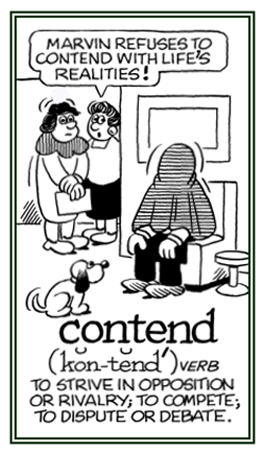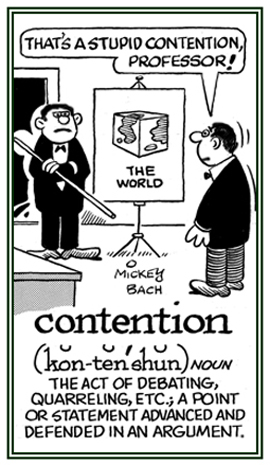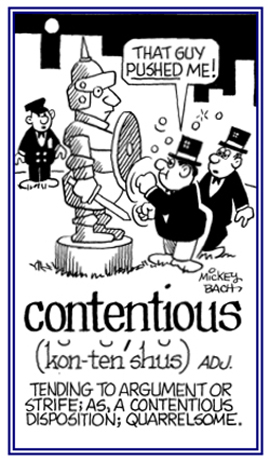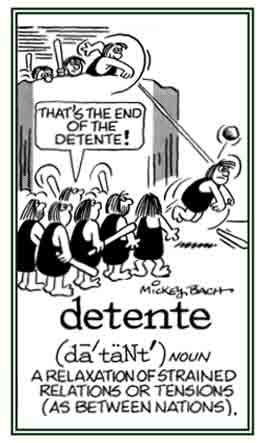tend-, tendo-, ten-, teno-, tenot-, tenonto-, tens-, tent-, -tend, -tension, -tent, -tense, -tensive, -tentious
(Greek > Latin: to move in a certain direction; to stretch, to hold out; tension; as well as tendon, sinew)
In radiography, or ultrasound, the difference between the energy that enters a body part and the energy that is not detected: "The differences that occur with attenuation coefficients are caused by the absorption and scattering of energy within the body tissues."
1. Agents or compounds that weaken the toxicity of a poisonous substance or the virulence of a microorganism.
2. An electrical device that reduces the amplitude of a voltage or current, with essentially no distortion of the waveform.
2. An electrical device that reduces the amplitude of a voltage or current, with essentially no distortion of the waveform.
Attenuvax (s) (noun)
A trade name, or trademark, for an active immunizing agent; such as, live measles virus vaccine.
coextend (verb), coextends; coextended; coextending
1. To open or to straighten something out; to unbend through the same space or duration of time.
2. To stretch or to spread out to a greater or the fullest length equally through space or time.
2. To stretch or to spread out to a greater or the fullest length equally through space or time.
The act of expanding or unfolding equally, or the state of being equally stretched through the same space or time.
Having the same limits, extent, boundaries, or scope: "The major city and the county that it is in are said to be coextensive."
coextensively (adverb) (not comparative)
A reference to having the same spatial extent or temporal scope or boundaries.
contend (verb), contends; contended; contending
1. To strive in combat or opposition; to fight, to struggle, to exert: The varsity football team of Jim’s college were able to contend very hard in order to win the football game for the first time.
2. To argue in a debate or in a controversy; to dispute: Jack and Frank contend that the reasons for providing a big theater in their village are wrong because there are only 200 inhabitants and the theater would cost a great deal of money to construct!
3. To compete in a competition to win something: Mike's high school basketball team will contend for the basketball championship next Friday.
4. To hold to a fact; to assert as being accurate: Ted's secretary was competent enough to contend that the contents in the minutes which she wrote during the last meeting were correct and that she didn’t make any mistakes.
5. Etymology: used from about 1440; from Latin contendere, "to stretch out, to strive after"; from com-, "with, together" + tendere, "to stretch".

© ALL rights are reserved.
Go to this Word A Day Revisited Index
2. To argue in a debate or in a controversy; to dispute: Jack and Frank contend that the reasons for providing a big theater in their village are wrong because there are only 200 inhabitants and the theater would cost a great deal of money to construct!
3. To compete in a competition to win something: Mike's high school basketball team will contend for the basketball championship next Friday.
4. To hold to a fact; to assert as being accurate: Ted's secretary was competent enough to contend that the contents in the minutes which she wrote during the last meeting were correct and that she didn’t make any mistakes.
5. Etymology: used from about 1440; from Latin contendere, "to stretch out, to strive after"; from com-, "with, together" + tendere, "to stretch".

Go to this Word A Day Revisited Index
so you can see more of Mickey Bach's cartoons.
1. A competitor; especially, someone who has a good chance of winning.
2. Any competitor in a contest who is seeking a prize or a title.
2. Any competitor in a contest who is seeking a prize or a title.
1. The act of disputing or being involved in a conflict or a quarrel:: The main contention the newly wedded couple had was that if they were to wait until they had enough money to pay the full cost of a car, they would be without one for a long time.
2. A statement or point that one argues for as being true or valid, even when it is not: The school principal’s assertion, or contention, that all of the students in his school were non-smokers was absolutely false!
3. Etymology: usage started in about 1382, from Old French contention, from Latin contentionem, from the stem of contendere, "to stretch out, to strive after", from com-, "together" + tendere, "to stretch".

© ALL rights are reserved.
Go to this Word A Day Revisited Index
2. A statement or point that one argues for as being true or valid, even when it is not: The school principal’s assertion, or contention, that all of the students in his school were non-smokers was absolutely false!
3. Etymology: usage started in about 1382, from Old French contention, from Latin contentionem, from the stem of contendere, "to stretch out, to strive after", from com-, "together" + tendere, "to stretch".

Go to this Word A Day Revisited Index
so you can see more of Mickey Bach's cartoons.
contentious (adjective), more contentious, most contentious
1. Regarding a person who is always ready to argue or who is quarrelsome: Edward was a very contentious boy because he often disagreed and argued with his parents about many things.
2. Pertaining to something which causes, or is likely to cause, disagreements and disputes between people with differing views: The superintendent told his secretary that it must be possible to reword the statement in a less contentious way.
3. Characterizing an issue or a subject matter which involves a dispute or is controversial: Lenora was convinced that it would be wise to avoid such a highly contentious topic as politics during dinner.
4. Descriptive of something which involves frequent and enjoyable arguments and disputes: After a contentious debate, members of the committee finally overwhelmingly voted to approve the funding for the financial loans.

© ALL rights are reserved.

© ALL rights are reserved.

© ALL rights are reserved.
Go to this Word A Day Revisited Index
2. Pertaining to something which causes, or is likely to cause, disagreements and disputes between people with differing views: The superintendent told his secretary that it must be possible to reword the statement in a less contentious way.
3. Characterizing an issue or a subject matter which involves a dispute or is controversial: Lenora was convinced that it would be wise to avoid such a highly contentious topic as politics during dinner.
4. Descriptive of something which involves frequent and enjoyable arguments and disputes: After a contentious debate, members of the committee finally overwhelmingly voted to approve the funding for the financial loans.



Go to this Word A Day Revisited Index
so you can see more of Mickey Bach's cartoons.
contentiously (adverb), more contentiously, most contentiously
A reference to anger and disagreements between people.
1. A disposition to fight or tending to provoke argument: "The contentiousness of the region's policies also involves one of the region's most contentious leaders."
2. Something that causes or is likely to cause disagreement or controversy.
2. Something that causes or is likely to cause disagreement or controversy.
1. The relaxing or easing of tensions or hostilities; especially, between countries: When opposing countries reach an understanding or a truce resulting in a lessening of threats of warfare with treaties, trade agreements, etc.; then they have a detente.
2. In mechanics, a part that stops or releases a movement: Some devices have a catch for controlling the detente which allows the clock to strike.
3. Etymology: from French, détente, "loosening, slackening" which came from Latin detendita, past participle of Latin detendere, " to loosen, to release"; from de, "from away" + tendere, "to stretch".

© ALL rights are reserved.
Go to this Word A Day Revisited Index
2. In mechanics, a part that stops or releases a movement: Some devices have a catch for controlling the detente which allows the clock to strike.
3. Etymology: from French, détente, "loosening, slackening" which came from Latin detendita, past participle of Latin detendere, " to loosen, to release"; from de, "from away" + tendere, "to stretch".

Go to this Word A Day Revisited Index
so you can see more of Mickey Bach's cartoons.
distend (verb), distends; distended; distending
1. To stretch out or to extend from an internal pressure.
2. To expand or cause to swell, as by pressure from within; to make or become swollen.
2. To expand or cause to swell, as by pressure from within; to make or become swollen.
Some related "tension" words are available at this tono- unit.


